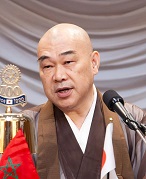Learning from the Wisdom of Zen
September 11, 2019
Mr. Sodo Yasunaga
Chief Abbot, Houkouji Temple
�� �ֹ����Բ���ԡ�This is one of the four precepts given by a notable Buddhist priest to his disciple during the Song Dynasty of China. It can be interpreted in a number of ways, such as ��too much praise will make a person overconfident�� or ��the world of Zen is too profound to be explained in words.�� I think it teaches that ��truth can never be explained in words so try not to give full explanation but make a person think by him/herself��. In the world of Zen, it is extremely difficult to pass down enlightenment to disciples. I believe the same applies to the world of business, as a renowned statesman Shinpei Goto (1857-1929) rightly pointed out, ��to leave behind a fortune is minimum, to hand down a business is average, and to pass down human resources is the best.�� It is always a challenge for leaders to cultivate qualified human capital that can be passed down as a resourceful asset.
�ֹ����Բ���ԡ�This is one of the four precepts given by a notable Buddhist priest to his disciple during the Song Dynasty of China. It can be interpreted in a number of ways, such as ��too much praise will make a person overconfident�� or ��the world of Zen is too profound to be explained in words.�� I think it teaches that ��truth can never be explained in words so try not to give full explanation but make a person think by him/herself��. In the world of Zen, it is extremely difficult to pass down enlightenment to disciples. I believe the same applies to the world of business, as a renowned statesman Shinpei Goto (1857-1929) rightly pointed out, ��to leave behind a fortune is minimum, to hand down a business is average, and to pass down human resources is the best.�� It is always a challenge for leaders to cultivate qualified human capital that can be passed down as a resourceful asset.
��In 2005, Steve Jobs made a speech at the graduation ceremony of Stanford University and called on the graduates to ��Stay hungry, Stay foolish.�� It is said that Jobs was fascinated by Eastern philosophies, cultures and religions including Zen. His words resonate with what the Buddhist priests teach their trainee monks. Monks are told to devote themselves to ascetic training by reaching new heights of sheer foolishness.
��I understand many of you run your own businesses. Now, have you decided to whom and how you will pass down your expertise, wisdom and business know-how? Interestingly enough, we can also learn from the ancient Chinese lesson that compares the relationship between priests and trainee monks to mother birds and chicks. A baby bird can successfully work its way out of the eggshell when it pecks from inside while the mother bird pecks from outside simultaneously. Likewise, a priest is expected to give an appropriate advice at the opportune moment when the trainee monk is about to break out of one��s shell and enter a new Buddhist order free from egoism.
��When you find a business successor and try to ensure the person has the right level of expertise, it is important to differentiate knowledge from wisdom. You can share knowledge that you have acquired as an information but when it comes to wisdom, it is impossible to pass it down. You can try to explain to a certain degree but your successor must awake to wisdom by him/herself.
��Throughout the long history of 2,500 years, the teachings of Gautama Buddha remain significant. We have tried to pass down wisdom by zazen (zen meditation) and zenmondo (zen debate) to attain the ability to understand each other through heart-to-heart communication. When I was a trainee monk, I worked hard under the Zen master Seikou Hirata over 15 years to learn the stories compiled in ��Koan�� and to seek responses to Zen puzzles and paradoxes. Now, I serve as a master at Hokouji Temple in Hamamatsu, Shizuoka Prefecture, and test my disciples with these stories and questions to help them unravel greater truths about the world and about themselves. I have to emphasize the most important role of a Zen master is to wait patiently for disciples to awake to wisdom by themselves. To be honest, it will be much easier for me to give the answers right away. But your disciples must realize the difference between what can and cannot be taught. It surely takes a lot of time and patience for a master to wait.
��Now, how can we know your disciple or business successor has awakened to wisdom? Let��s take an example of a science experiment using two tuning forks. Striking one of them will cause the other to resonate when it has the same wavelength. The same applies to human personality. Each one of us has a distinctive character but we can resonate if we are on the same wavelength and this can lead to heart-to-heart communication that has long been passed down in the Zen teachings. Each paradox of Zen has its own wavelength and trainee monks try to tune into it through zazen to reach the world of Buddha. Zen training can take as long as 10 to 15 years through which the disciples try to apply Buddhist doctrines to everyday life.
��As I close my speech, let me remind you that when you try to pass down what you have attained through your life to the next generation, you cannot and should not teach everything. You have to be patient enough to wait for the younger generation to reach that moment of realization. As two tuning forks resonate, there is surely a world that we can share and appreciate together. Being a master of your own business world, I am convinced you agree to what I have shared today.